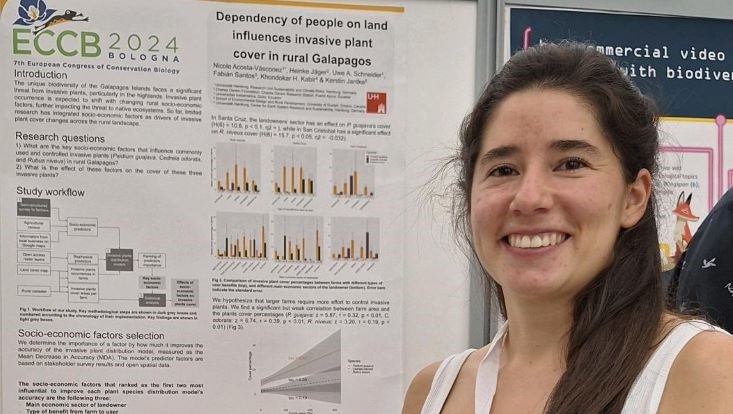Nicole Acosta presents Galapagos research at ECCB 2024 Congress in Bologna
18 June 2024

Photo: Nicole Acosta
The 7th European Congress of Conservation Biology (ECCB 2024) was held from June 17-21, 2024 in Bologna, Italy. Organized by the Europe Section of the Society for Conservation Biology, the congress facilitated the exchange of conservation science, practice, and policy to promote biodiversity conservation in Europe. The theme "Achieving a Biodiversity-Positive Status by 2030" presented a call to action towards conserving biodiversity despite challenges. ECCB 2024 provided a platform for researchers, policymakers, and practitioners to share knowledge, exchange ideas, and collaborate towards a sustainable future.
FNK's PhD Student Nicole Acosta attended the congress and presented a poster about her research on Socio-Economic Drivers of Invasive Plant Cover in Rural Galapagos. Her study investigates how people's dependency on land influences the cover of invasive plants across rural areas of the Galapagos Islands. Key findings include:
- Farmers relying on agriculture and pensioners had lower percentages of invasive plant cover on their land, likely due to actively controlling invasive species to prevent competition with crops.
- Landowners perceiving no benefit from their land and those dependent on the public sector were linked to higher invasive plant cover.
- The most influential socio-economic factors driving invasive plant distributions were the landowner's primary source of income, the type of benefit derived from the farm, and size of the farm.
- The results quantify previously hypothesized relationships between rural livelihoods and invasive species management in the Galapagos.
Understanding these socio-economic drivers is crucial for mitigating threats to the islands' unique biodiversity from invasive plants.
Nicole's doctoral research is funded by the German Academic Exchange Service. She is supervised by Dr. Kerstin Jantke and Prof. Uwe Schneider and closely collaborates with researchers from the Charles Darwin Research Station in Puerto Ayora, Santa Cruz, Galapagos and the Universidad Indoamérica, Quito, Ecuador. Nicole is also a member of the School of Integrated Climate and Earth System Sciences (SICSS) and the Cluster of Excellence "Climate, Climatic Change, and Society” (CLICCS) contributing to the CLICCS project C2 - Sustainable Land-Use Scenarios: Soil, Biodiversity, Water, Food and Energy Security.



